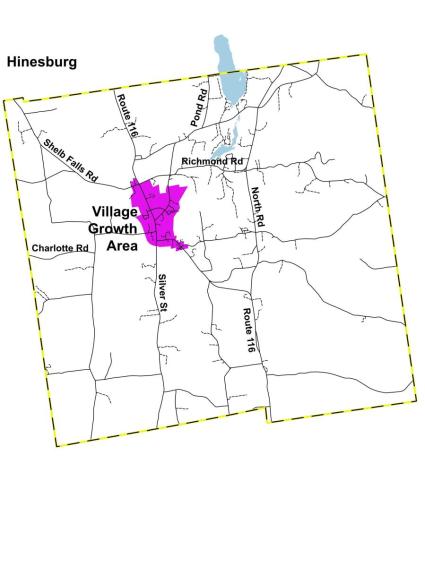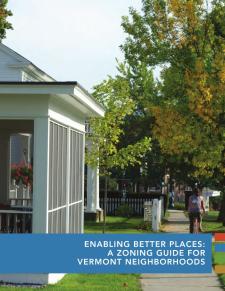Zoning Modernization for Housing
- Planning Commission public hearing on April 10, 2024
- See the Regulation Revisions page for the actual proposal language
- See the end of this page for additional background and maps
Overview
Over the last few years, there have been significant changes to the State law that governs municipal zoning and land use regulations. These have largely been in response to Vermont’s housing supply and affordability problems. Most of these changes were geared to make it easier to create new housing.
With funding from a State Municipal Bylaw Modernization Grant, the Planning Commission engaged a planning consultant (PlaceSense LLC) to analyze Hinesburg’s existing land use regulations and help us make revisions to align with State law, and to enable the creation of more housing, especially more affordable housing. The area affected is principally the Village Growth Area, but some changes will have a townwide effect. Some examples:
- Duplexes - treat the same as single-unit dwellings in terms of lot area, setbacks, etc.
- Three-plex and four-plex buildings – remove barriers and simplify required review.
- Accessory apartments - allow for at least 900 square feet of living space (more depending on the size of the principal home); remove bedroom limits and access drive restrictions.
- Affordable housing – increase the amount required in larger developments.
- Residential density – replace our current density bonus system with a more simple and consistent system that complies with State-mandated bonuses.
Why Are These Changes Needed?
We are compelled to make many of the changes because of revisions to State law over the last few years. In Vermont, land use decisions and most development review/permitting happen at the local level – i.e., towns and cities. However, municipalities only have the regulatory powers that are prescribed in State law. Many State officials feel that municipalities are partially to blame for Vermont’s housing crisis – because of outdated zoning and a reticence to plan for and accept significant residential development. As a result, laws have been passed over the last few years to pre-empt municipal zoning authority, in favor of limited statewide zoning mandates.
Vermont's housing crisis is real and stems from a number of factors – e.g., a slowdown in residential construction after the 2008 economic collapse, lending restrictions enacted after the great recession, increased cost of building materials, supply chain shortages since the onset of the covid pandemic in 2020, a shortage of skilled labor, rising cost of land, inadequate State and Federal funding for infrastructure, antiquated municipal and State permitting, and unwieldy and slow appeals processes. Hinesburg is not immune, as evidenced by the real estate market (limited supply, high house prices, fast sales) and frequent housing queries on Front Porch Forum. For more information, check out the "Locked Out" series by Seven Days.
Admittedly, a large amount of new housing in Hinesburg's village area was permitted in 2022. The Kelley’s Field 2 senior housing project is under construction, and the Haystack Crossing and Hinesburg Center 2 projects could break ground in 2024 pending State permits. With that said, zoning updates are still needed to better enable infill and redevelopment. Some zoning regulations were designed with single unit homes in mind, and discriminate against other types of housing like duplexes. Sometimes zoning regulations don’t even allow for new development that looks like what we already have.
 In 2020, the State launched the Zoning for Great Neighborhoods project to help municipalities improve their zoning regulations and incrementally remove unnecessary barriers to creating more homes. Together with this guide and the expertise of our consultant, we’ve crafted zoning revisions to comply with State law and allow a wider range of housing types.
In 2020, the State launched the Zoning for Great Neighborhoods project to help municipalities improve their zoning regulations and incrementally remove unnecessary barriers to creating more homes. Together with this guide and the expertise of our consultant, we’ve crafted zoning revisions to comply with State law and allow a wider range of housing types.
Project Schedule
- March 8, 2023 - Planning Commission meeting - a primer on the project and the State's guide
- March-August 2023 - Planning Commission meetings - working with consultant, discussing options
- August-October 2023 - Planning Commission meetings - refining proposal
- October-December 2023 - pause for work on other projects
- January-February 2024 - Planning Commission meetings - finalize proposal
- April 10, 2024 - Planning Commission public hearing for community feedback
- Spring/Summer 2024 - Select Board review, public hearing, and possible adoption
Questions or Comments:
Contact Alex Weinhagen (Director of Planning & Zoning) at 802-482-4209, aweinhagen@hinesburg.org, 10632 Route 116, Hinesburg, VT 05461
See the Regulation Revisions page for the actual proposal language
| Attachment | Size |
|---|---|
| 6.55 MB | |
| 1.09 MB | |
| 78.28 KB |
